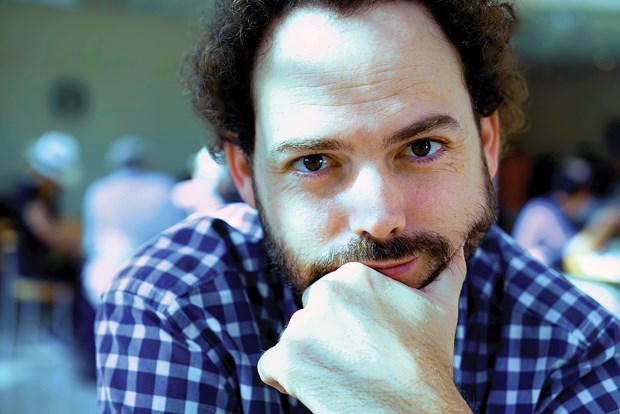In Drake Doremus’ new film Equals, starring Kristen Stewart and Nicholas Hoult, love, passion and anger have been genetically removed from the human equation in order to produce more pliant, efficient individuals.
Any deviation from the desired blancmange mood state cultivated by a surviving futuristic society known as The Collective is considered a disease – Switched On Syndrome (SOS) – to which there is no cure.
It doesn’t seem like such a great leap from our current reliance on mood stabilizers and suppressants – which level out our emotions and kill our sex drive – to the orderly and empty future of The Collective. Does that mean Doremus is a pessimist? “I think I’m an optimist,” he says. “But I do think that the way we’re disconnecting ourselves now can get out of hand, with all the technology and the way we have a very inorganic way of meeting each other.”
Nathan Parker (Moon) wrote the screenplay. Silas (Hoult) has an everyday schedule that does not vary: he eats meals in his Spartan apartment, goes to his work as an artist/historian in a sterile white office, makes small-talk with his co-workers, is inundated with video warnings about the symptoms of SOS, and returns home to eat, play math games, and sleep in his apartment, solo.
But one day a man and woman are separated, dragged away screaming from one of the tower blocks. On another day, a citizen jumps to his death and lands outside Silas’ workspace window. The act is met with uniform complacence, save for Nia (Stewart), who seems … upset?
Silas starts to observe Nia and becomes more discombobulated by new, strange stirrings. He is diagnosed with stage-one SOS, which means he can’t eat lunch at the same table as his workmates and that he has a new diet of pills to take each morning. It also means that he’ll end up in a hospice for people who care too much, where most patients commit suicide. But he is increasingly drawn to Nia.
And so this is a science-fiction movie, sort of. Doremus previously directed 2011 Sundance Grand Jury Prize winner Like Crazy and the forbidden love story Breathe In; being the indefatigable romantic that he is, he couldn’t help but take on another intimate love story.
It’s refreshing, watching characters in a sci-fi film throw their clothes on the ground and mess up those pristine white living spaces. “It’s funny, I feel that way about sci-fi too: I’m fascinated by it, enamoured, but it’s not my bag essentially,” Doremus says. “I wanted to make a really warm film, turn (the genre) on its head and make something different.”
I mention that the Silas and Nia’s love story could have been set in either the future or in the very distant past: Nia and Silas are like Adam and Eve, discovering sin and attraction for the first time.
“That’s good, I’m going to use that!” Doremus laughs. “People ask me on Twitter all the time, ‘how did they know where to put their mouths?’ and ‘how did they know what to do?’ But man, that’s all instinct!”
“It’s a very tense, intense, and at times sexually instinctual experience.”
In order to achieve that kind of seemingly effortless intimacy Doremus says he and his actors – including Guy Pearce and Jacki Weaver – had to become friends and collaborators first. It was difficult for them, he acknowledges, but Stewart and Hoult “are both so mature and wise beyond their years… they’re really 40.”
There are a lot of close-ups that demand subtle facial cues, and colour that encroaches on the film to coincide with Silas’ sensory awakening. Doremus worked with frequent collaborator John Guleserian, with whom he went to AFI film school. “We’ve known each other for 13 years now,” he says of the cinematographer. “It’s a friendship where there are no boundaries, we just call each other on it. I think this is his best work yet.”
In the end “we felt like we were making a tiny little movie in our backyard,” says Doremus of his cast and crew, albeit a Zen Buddist garden in Japan and Singapore, where the stark interiors and grounds were shot. A suitably intimate work environment for a director/incurable romantic: “We can easily lose sight of things… What is love, if not the most important thing for human beings?”



